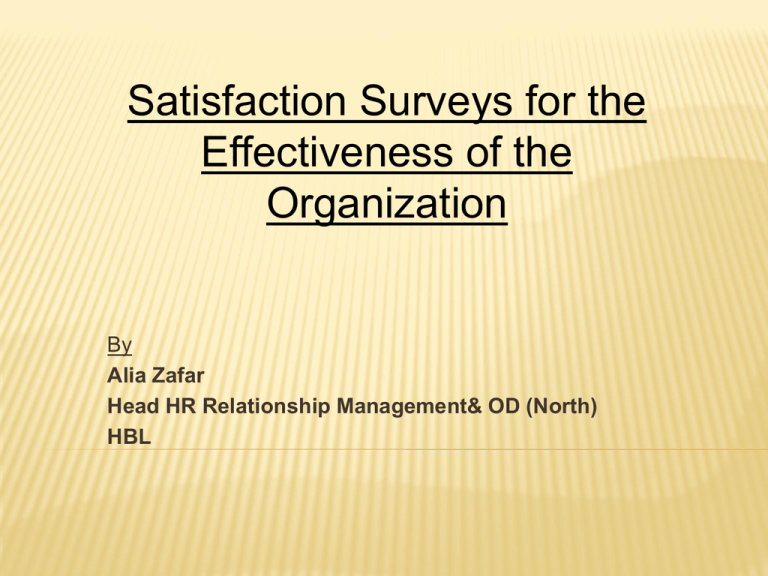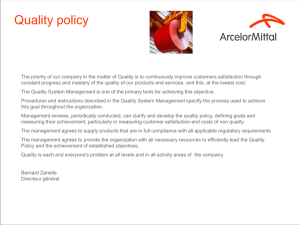HBL- Satisfaction Surveys for Effectiveness of
advertisement

Satisfaction Surveys for the Effectiveness of the Organization By Alia Zafar Head HR Relationship Management& OD (North) HBL Why Use Satisfaction Surveys – For Better Communication & Feedback System Global Reality “Satisfied, motivated employees facilitate higher customer satisfaction and positively influence organizational performance. ” When Do We Use Satisfaction Surveys Decreased productivity due to specific reasons: • Limited budget • High turnover • Low communication Change in the status quo: • Re-organization • Change in policies • Period of rapid growth Excessive rumors Highly competitive industry Contemplated changes in pay and benefits When Do We Conduct Satisfaction Surveys Why? Why? •Do you have employees? •Do you know how they feel about their jobs and their work environment. Why Conduct Satisfaction Surveys? Understand the drivers within your organization and resultantly: Identify cost-saving opportunities Improve Predict productivity and explain turnover Identify areas of ethics, honesty and value concerns Strengthen Evaluate issues management skills and training customer-service problem areas and Why Conduct Satisfaction Surveys? Help in Identifying training needs Identify communication bottlenecks and problem areas Benchmark your organization's perceived progress relative to competitors in the industry Gauge employees' understanding of and agreement with corporate rules, policies and mission Impact of Surveys Positive corporate Brand image Improved organizational performance Positive employee beliefs Favorable employee opinions Positive employee attitude SATISFACTION SURVEY PROCESS Satisfaction Surveys – Initiation Process Each employee satisfaction survey program is executed a little differently depending on individual company needs and resources. Complete programs often start with separate employee and/or management focus groups, which have the dual purpose of: Gaining support employee involvement for the employee satisfaction program while gathering critical input to be used in designing the actual employee satisfaction survey. Selling the Survey to Management The task then becomes convincing critical decision makers of the need for such a survey. If the survey is unbudgeted, the task may seem formidable - but it is not. Design of Survey •Feedback sessions with employees •Focus group Meetings •Feedback from top Management HBL Satisfaction Surveys Pilot project and its utilization for refinement of 1st Satisfaction survey Setting priority Feedback from all the sources specified in the design of the survey Feedback from relationship leaders Selecting the Methodology for HBL Conducted In-house after successful pilot project Random computerized selection of target population Population representative of overall population ratios Design of the Questionnaire • A six factor Questionnaire with twenty six questions was developed • Likert scale used for measuring the level of satisfaction • Management concerns taken into account to set priorities • Identification of priority areas by employees taken in to account in the design of the survey Design of the Questionnaire (Contd…) • Close ended questions used • One segment of open ended comments added which was tabulated and analyzed separately • Dissemination methodology devised Marketing the Survey Determined the target audience Created awareness of the survey through use of internal communication channels Communicated the benefits through fliers designed to create awareness Made employees aware of the process Interpreting & Acting on Results Developed Action Plans To Improve Employee Satisfaction Provided the line management a specific analysis of each group Provided guidance on how to read results and use the information in decision making Modified areas of concern highlighted by employees Created a bench mark of .5% raise in the satisfaction score for the next year Made the process one of empowerment and assigned responsibility for implementation of Action Areas to cross functional groups QUESTIONS? THANK YOU


